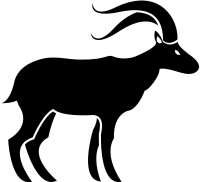Ovors
Ovors [OH-vor] (also ovorr, plural ovorn) are common domestic herd animals found throughout the Civilised World, used for their meat, skins and wool. They are agile creatures with a thick matted fur and small conical horns for defence, though many herdsmen blunt these.
Faunaplugin-autotooltip__small plugin-autotooltip_bigFauna
List of animals of all kinds, both red-blooded and virid, domesticated and wild.
Subcategories
Articles
All
Red-blooded Fauna
Virid Fauna
topics sci1
 This is in a series of articles about Animalsplugin-autotooltip__small plugin-autotooltip_bigFauna
This is in a series of articles about Animalsplugin-autotooltip__small plugin-autotooltip_bigFauna
List of animals of all kinds, both red-blooded and virid, domesticated and wild.
Subcategories
Articles
All
Red-blooded Fauna
Virid Fauna
topics sci1.
Their meat is a staple food in Anrel, where fine ovorn wool is one of its principle exports.
Ovors are one of the oldest breeds of domestic animal, suited to cool and temperate climates. Though hardy creatures in cold climates, they are not tolerant to virid grazing, like humans, suffer poisoning if they consume too much. Consequently they are more common in the Natorn Archipelago, and the cooler upland regions of Anásthias which are well cultivated and greened.
Ovorn wool
Ovors have a dense brown coat which naturally grows in flat, matted pads, resembling felt. These pads both keep the animal warm and dry, and serve as armour against predators. Ovors naturally shed these mats over time, but herdsmen clip them once or twice a year, depending on the climate. These pads are traditionally beaten into a dense waterproof fabric, using a soft mallet. Ovorn felt is used to make coats, gloves, boots, floor tiles and even roof shingles.
Ovorn wool is produced by soaking pads in warm water which loosens the fibres, allowing it be teased out into a pale yarn. Finer yarn is made by cooking the mats in hot water, which softens the fibres and releases the wool grease. Fine ovorn wool is not waterproof, but can be dyed into a variety of colours. The waxy residue, called wool grease or coat-grease, is used for a wide variety of purposes such as waterproofing leather and fabrics, as lubrication for carts and ships, and for making soap, candles and cosmetics.